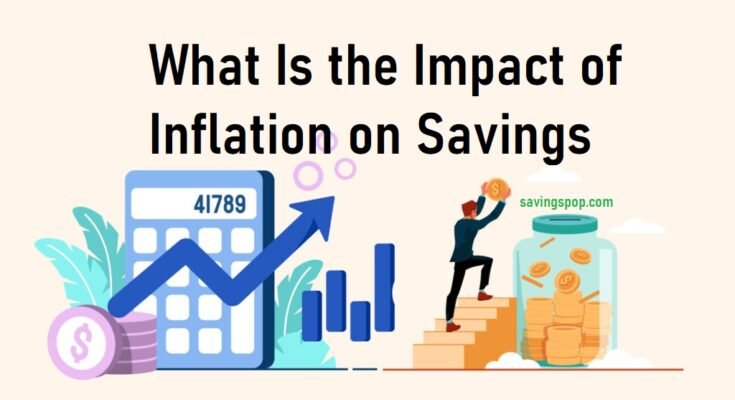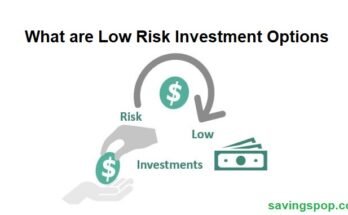Inflation is a persistent upward push inside the expenses of goods and services, decreasing the shopping energy of money. This phenomenon appreciably influences economic savings, making it essential for humans to apprehend and plan for its effects. This article will delve into what is the impact of inflation on savings and explore strategies to mitigate its effects.
What Is the Impact of Inflation on Savings
Definition and Types of Inflation
Inflation refers to the overall price boom and falls within the shopping value of cash over the years. It is commonly measured through indices including the Consumer Price Index (CPI) and the Producer Price Index (PPI). The most important sorts of inflation include:
- Demand-Pull Inflation: Occurs when demand for items and services exceeds their delivery, main to higher prices.
- Cost-Push Inflation: Results from expanded prices of production, causing corporations to elevate fees to hold profit margins.
- Built-In Inflation: This happens when organizations and people anticipate expenses to upward push, main to higher wages and charges as a self-pleasant prophecy.
Understanding these types helps in identifying the root causes of inflation and addressing them appropriately.
Measurement of Inflation
Inflation is measured using various indices:
- Consumer Price Index (CPI): Tracks adjustments inside the prices of a basket of customer goods and services.
- Producer Price Index (PPI): Measures adjustments in the charges obtained by manufacturers of products and services.
- Core Inflation: Excludes risky gadgets like food and energy expenses to offer a clearer picture of underlying inflation traits.
Historical Perspective
Examining past inflation rates provides valuable insights into their effects on the economy & savings. For instance:
- 1970s USA: Characterized by using excessive inflation, called stagflation, where inflation and unemployment were each excessive.
- Hyperinflation in Zimbabwe: An extreme case where inflation rates reached astronomical tiers, rendering the local currency nearly nugatory.
These historical examples highlight the impact of inflation on financial savings and retaining economic balance.
Inflation’s Direct Impact on Savings
Erosion of Purchasing Power
Inflation reduces the real fee of money, meaning your financial savings can purchase fewer goods and offerings over time. For instance, with an annual inflation rate of 3%, $100 today is probably really worth the great $97 in a year in phrases of buying energy. This erosion makes it more difficult to preserve your fashionable of living.
Interest Rates and Inflation
Interest charges and inflation are closely connected. Central banks, just like the Federal Reserve, alter interest prices to manipulate inflation. The real interest charge is calculated by way of manner of subtracting the inflation rate from the nominal interest fee. If the nominal fee is 5% & inflation is 3%, the actual charge is 2%. Understanding this courting is critical for savers to guard their cash from inflation’s eroding effects.
Strategies to Mitigate Inflation’s Impact on Savings
Several strategies can help protect savings from inflation:
Investing in Inflation-Protected Securities
- Treasury Inflation-Protected Securities (TIPS): These U.S. Authorities bonds modify with inflation, retaining your shopping for power. They provide a hard and fast hobby charge plus an adjustment for inflation, making them a secure opportunity for lengthy-time period savers.
Diversifying Investments
- Asset Diversification: Spreading your money through special asset instructions, which include shares, bonds, and actual property, reduces danger and may help hedge in opposition to inflation. Diversification guarantees that no longer all of your investments are identically affected by inflation.
Real Estate and Commodities
- Real Estate Investments: Property values regularly upward push with inflation, making the actual property an amazing hedge. Rental earnings can also boom with inflation, supplying a constant income circulate.
- Commodities: Investing in commodities like oil, gold, & agricultural products can defend against inflation, as their fees tend to rise when inflation increases.
Precious Metals
- Gold and Silver: These conventional inflation hedges generally tend to hold their fee over time. They can be a haven in the course of intervals of high inflation and financial uncertainty.
Inflation and Retirement Savings
Inflation can drastically impact retirees who rely upon fixed earnings. Here are a few strategies to counter this:
Inflation-Adjusted Annuities
- Annuities: These provide bills that grow with inflation, supporting retirees to preserve their shopping strength. They can be an effective way to ensure steady profits that maintain tempo with growing expenses.
Diversified Portfolios
- Retirement Portfolios: Including shares, real property, and different properties on your retirement portfolio can assist hold purchasing energy. Diversified investments can provide growth and earnings that hold up with inflation.
Regular Reassessment
- Financial Planning: Retirees ought to frequently overview their finances to make sure their financial savings maintain tempo with inflation. Adjusting investments and spending conduct can assist manage the impact of growing costs.
Inflation in Different Economic Environments
The impact of inflation varies by using vicinity. Developed economies often have lower, greater solid inflation, even as developing economies can enjoy higher and extra risky inflation. Understanding these differences is important for international savers.
Developed Economies
- Stable Inflation: Countries like the USA, UK, and Germany generally experience lower and more predictable inflation rates. Central banks in these regions actively manage inflation through monetary policy.
Developing Economies
- Higher Inflation: Countries like Venezuela, Zimbabwe, and Argentina have experienced high inflation prices. Political instability, monetary mismanagement, and external shocks can cause full-size inflation in these regions.
Government Policies and Inflation
Governments use fiscal and monetary policies to control inflation. Here are some common measures:
Monetary Policy
- Interest Rate Adjustments: Central banks may also increase interest fees to chill an overheating financial system and reduce inflation. Higher hobby charges make borrowing more luxurious, slowing down spending and funding.
- Quantitative Easing: In times of low inflation or deflation, vital banks may additionally purchase securities to increase the money supply and encourage spending.
Fiscal Policy
- Tax Cuts and Spending Increases: Governments can use economic rules, including tax cuts or expanded spending, to stimulate the economic system. These measures can have an impact on inflation using affecting the mixture calls for.
- Subsidies and Price Controls: These can assist manage inflation within a short period however, they may additionally cause market distortions if used excessively.
Future Trends and Predictions
Experts predict varying future inflation trends. Technological advancements, demographic changes, and economic policies will shape inflation in the coming years.
Technological Advancements
- Productivity Gains: Technology can reduce production costs, potentially lowering inflation. Automation and innovation can lead to more efficient production processes and lower prices for consumers.
Demographic Changes
- Aging Populations: In many developed countries, aging populations can impact inflation. Older populations may spend less, reducing demand and putting downward pressure on prices.
Economic Policies
- Monetary and Fiscal Policies: The actions of central banks and governments will continue to influence inflation. Policies aimed at stimulating growth or controlling inflation will play a crucial role in shaping future inflation trends.
Personal Experiences and Case Studies
Real-life examples illustrate inflation’s impact. For instance, someone saving for a house may find their savings eroded by inflation. Financial advisors recommend strategies to protect savings, including diversifying investments and regularly reviewing financial plans.
Case Study 1: Saving for a Home
- Impact of Inflation: A young couple saving for their first home finds that their savings lose value due to inflation. Rising property prices mean they need to save more to achieve their goal.
- Strategies Used: They invest in a mix of stocks, bonds, and real estate to hedge against inflation. They also consider TIPS to preserve their purchasing power.
Case Study 2: Retirement Planning
- Retirement Savings: A retiree with a fixed pension finds it tougher to cover expenses as prices rise. Inflation erodes the fee of their constant income, making it tough to keep their trendy dwelling.
- Strategies Used: The retiree invests in inflation-adjusted annuities and diversifies their portfolio to include belongings that can develop with inflation.
Conclusion
Inflation poses a good-sized task to savers internationally by eroding the buying power of money through the years. This article has explored what is the impact of inflation on savings, from diminishing actual returns to influencing investment choices and retirement planning.
By information inflation’s dynamics and employing techniques like making an investment in inflation-included securities, diversifying portfolios, and adjusting monetary plans frequently, people can shield their financial savings from inflationary pressures.
As monetary environments evolve and regulations trade, staying informed and proactive in economic management stays essential for mitigating the lengthy-time period outcomes of inflation and ensuring economic balance for the future.




